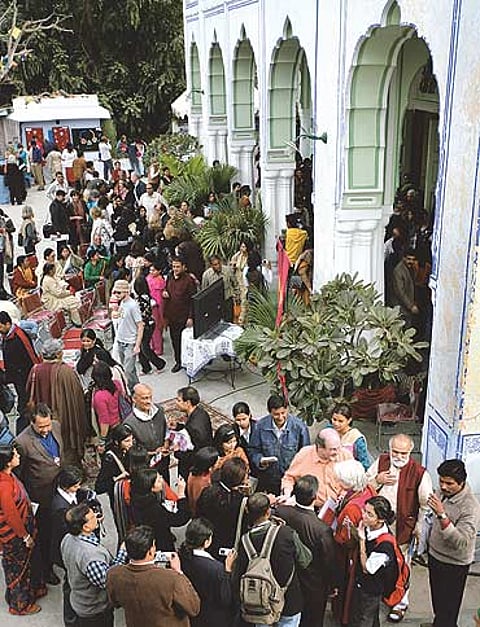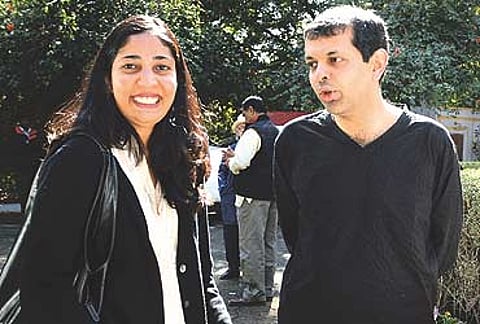Literary Schtik
A galaxy of stars, eager readers: the Jaipur litfest climbs a notch

She remained stoically stone-faced through this unoriginal version of schoolyard bullying. Her revenge came when the seats filled up despite the absence of the Front Row Authors. Deshpande, as the organisers foresaw, is a big draw in Jaipur—the only author at the festival to receive a special invitation from the city university's English department to address college lecturers. With that under her belt, and her books selling at a respectable trot, she could afford to be more generous: she punctiliously attended Rushdie's packed session.
"I'm incredibly nice," was one of Rushdie's observations about himself while on the stage. The master story-teller effortlessly portraying a version of himself. But there's a semblance of truth there. He is still thorny, of course, especially with the media, hinting at old wounds that are still bleeding. But at 60, the role of ageing patriarch is beginning to suit him: he thaws under the reverence. Patient, courteous—even with autograph-hunters and cranks—he is almost (dare one use the word?) affable. And with the young, he blossoms: whether it is addressing "fearless" high school children questioning him on fundamentalism, or advising a volunteer—a sort of "child-minder" he's saddled with to fend off intruders—on which of his books she should start reading as a crash Rushdie course (Midnight's Children, of course!). There's an endearing side to him that he doesn't display publicly, whether it's eating chaat outside Birla mandir despite the volunteer's admonitions about hygeine, shopping (Pashmina shawl for himself and silver bangles for Padma Lakshmi), snapping photos of Jaipur ("for my younger son") or showing Suketu Mehta around Fatehpur Sikri "because he'd never been there before. "
Baby Halder, whose extraordinary life story, A Life Less Ordinary, of how she grew from a domestic worker to writer, wasn't one of the chosen ones. But she had her large audience, including the agent David Godwin, who was profoundly moved by her story. And if one examined that particular game of measuring fame, the line that collected for her autograph was longer than even those that Suketu Mehta or William Dalrymple's scintillating sessions yielded. And her book sold out—not only the copies at the litfest, but the entire print run. It was a unique moment for an Indian litfest: a star had just been born that sunny morning in Jaipur, and there was talk of her going to Hay-on-Wye next.

If Rushdie played his role of benevolent patriarch of young Indian talent laudably, others weren't so accommodating. Suketu Mehta, for instance, quickly gained the reputation for being "difficult". It began with a tussle for first-class airfare, apparently, that ended badly. He thought he deserved a first- class ticket; his sponsors thought otherwise. Then, there was some issue about his hotel room: a faulty faucet was the pretext. But once an exchange of hotels brought him closer to his New York friends, he cheered up, able to take some friendly teasing by Dalrymple about "writers belonging to a club". "Yes," he responded, deadpan, "we have a secret handshake".
Secret password or not, the feeling of being excluded persisted among writers. Included in the list of 14 writers carefully hand-picked for the litfest were three Rajasthani writers, including the hugely popular poet Sheen Kaif Nizam. Lodged in the same hotel wing as the Indian English stars, it was as if they were from another planet: their orbits never touched. What exactly was the point of inviting them to a litfest dominated by expatriate writers, apart from its political correctness, never became clear. Unless, of course, it was to demonstrate their sizeable readership in the city. Nizam Saab, as he's known here, drew a packed hall, with admirers overflowing into the seats being set out on the lawns in anticipation of Rushdie's session which followed, but nobody even seemed to notice, not even Rushdie, whose slight on bhasha writing still rankles in regional breasts.
The other surprise at this litfest was the way books were actually selling. It's common wisdom by now that book events don't actually materialise into sale of books, and both the expatriates and their agents were somewhat bemused by what surely is an Indian phenomenon: autograph-hunters lining up with scraps of paper instead of books. Pre-orders at the litfest tent were modest to begin with: some 20-50 copies of each. But by the second day, more copies were being rushed into Jaipur, prompting writers to keep stealthy track of their books' sales. It was the acid test, and not everyone was happy with the results.
For William Dalrymple, who played a key role in "getting his friends to come" for the litfest, and had been there last year when there were four authors and an audience of 25, it was a proud moment: "It's become a major litfest now, and gone on the literary map," he said. And so what if they had to sing for their supper, look at the perks: "entertaining programme, great ambience, a bookish audience, half of them having driven down from Delhi for the occasion, the company of other writers, and it's all free." For a similar event anywhere else, as he was quick to point out, "readers would have to pay up to 25 pounds to meet Rushdie."
Chuffed by the response, the Jaipur festival's organisers are getting more ambitious. Next year, they promise, it'll be Orhan Pamuk or Amartya Sen, or both. This one is here to stay, for sure.
Tags